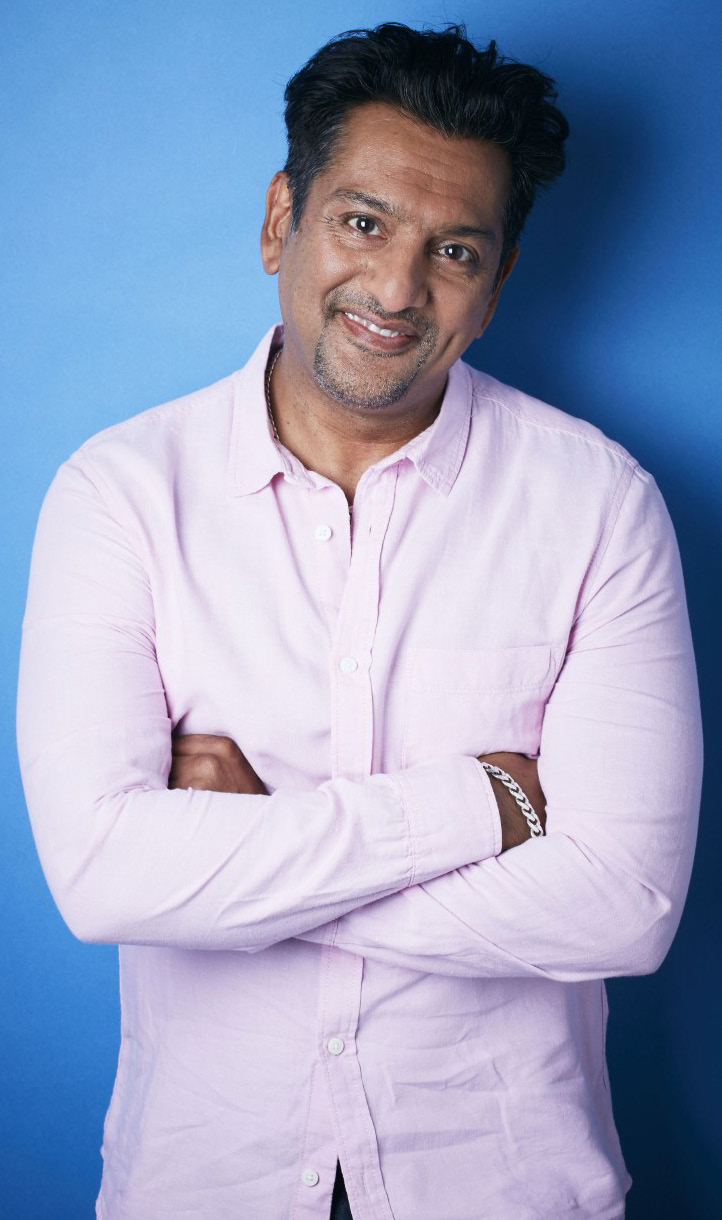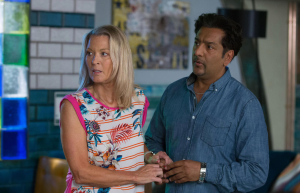
By: LekshmiSajeev
NITIN GANATRA ON HIS ACTING JOURNEY AND LEAVING MUCH-LOVED ROLE MASOOD
by ASJAD NAZIR
An entire generation of British Asian actors can thank Nitin Ganatra for blazing a trail with winning performances in diverse mediums during a 24-year career filled with many memorable moments.
The gifted actor has shown off his impressive range in theatre, cinema and on a variety of TV projects, which includes EastEnders’ longest-serving Asian character, Masood.
Although he has played many marvellous roles, perhaps his biggest achievement has been an impressive body of work in a country that doesn’t open many doors for talent of south Asian origin.
The fearless actor, who recently returned to the stage after a gap of 16 years, is playing a wizard in a forthcoming series and looking to crossing more frontiers.
Eastern Eye caught up with Nitin to speak about his impressive journey, leaving EastEnders, hopes and advice he would give aspiring actors.
How do you look back on your journey as an actor?
I like to look forward, not backwards, or at least appreciate what’s in front of me. But, after 24 years as a professional actor, I realise that you never really ‘arrive’. I’ve managed to survive and sustain a career that has lots of flaws. There are good jobs and lousy jobs, but most actors just want to work and be creative. Being paid is even better. Being Asian has had its difficulties. There is much to address with institutional racism. However, I am blessed to have worked with so many amazing people. Om Puri, Anupam Kher, Johnny Depp, Ray Winstone! I have done work I am very proud of, even when I had only one line. When I look back, I think, I’ve done pretty well. But when I look forward, I think, I could do better. In the end, it’s better to stay present.
You have played diverse roles in various mediums, but which was the most challenging?
Boredom is the most challenging thing for me. I’m not sure if a particular medium is harder than any other. You can learn anything if you apply yourself. I think I enjoy moving from medium to medium.
Which of your characters have you enjoyed playing the most?
I enjoyed Kholi from Bride and Prejudice a lot as I had fun creating the character. (Director) Gurinder Chadha trusted me to work on it and come back with this outrageous loveable fool. It was a joy to perform. And, recently, I did a play called End Of The Pier playing Mohamed where I effectively had only one big scene. There was a real thrill in trying to work out how to find this character and shape the journey in this one big scene. It was a very challenging role.

How do you look back on your journey in EastEnders?
Being on EastEnders was a strange and humbling experience. I have huge respect to the people that I work with day in day out creating stories, scripts and filming. People are very quick to judge soaps as a little lowbrow or sensationalist, but once you work there, you realise how much effort goes into working at such an intense pace to deliver four episodes a week. My journey on the show has had its ups and downs, but always been fruitful. Masood has been the longest-serving Asian character in EastEnders’ history and is deeply loved by audiences, and has become one of the first cross-over characters. On a daily basis, people from all walks of life and cultures stop me to tell me how much they relate to Masood. An Asian character has rarely appealed to such a varied group of people. So, I am proud of my contribution to making this one of the best-loved Asian characters in the UK television history.
What has been your most memorable moment as Masood?
My very first scene with the legendary Phil Daniels! I was in awe!
How do you feel about letting go of Masood and will he return?
In one way, I feel sad about letting go of the character. I feel that Masood had taken a seat so far back in the bus, that there was really nowhere to go, but off the bus. I feel that there is so much more to find in this character as he has an everyman quality to him (I say this through the response I get from the public from all walks of life). He can go in so many directions if the show so desired. But for now, as I say, I had to step off the bus. However, I also have a very strong urge to play characters in other shows and go back to being a creative actor. Will I ever return? Of course! I love Masood.
Recently, you successfully returned to the stage after a very long gap. Why did you take such a long break from the theatre?
It had been 16 years away from the stage. The reason for this is personal and profound. Theatre is what I love the most of all the mediums as it is where I started. But I had fallen out of love with it. Something in me changed and I’m not sure why. I simply didn’t believe it anymore, it felt fake, and that was not why I went into acting. I wanted to keep digging for the truth and being more honest. And I felt the opposite. So I stopped, for good, so I thought.
Tell us, according to you, what is the secret of a great performance?
Being truthful, being honest and being vulnerable, without tricks and vanity. But also to have stagecraft and discipline.
Does your approach change between theatre and television?
Essentially, nothing changes; do your homework, turn up knowing your lines and be professional. Leaving your ego outside and treating people with respect. However, moving from theatre to TV involves minor adjustments in your performance, technically. For example, you don’t need to be as big in your performance in a closeup. But you still need ‘energy’. It is a technical shift more than anything else.
Which genre do you prefer as an actor?
I am very lucky as I am able to move very easily between genres. I can go from drama to comedy. As I mentioned earlier, I hate getting bored. It’s my worst enemy, so moving between different styles keeps me awake and interested in my work.
Work-wise, what can we expect next from you?
Last year, I had a small part in the Hell Boy movie and another film called Eaten By Lions and the play End Of The Pier as well as being briefly on EastEnders. I have just finished a guest role in Midsomer Murders and am currently working on CBBC-Netflix show called The Worst Witch, where I am playing a wizard. Never played a wizard before. And I’m having a fabulous time.
What is the master plan going forward?
I don’t have one, not anymore. I think, with more and more young Asian writers, directors and producers coming on the scene, I am hoping there will be a shift in the current diversity ditch we are trapped in. In the meantime, I am writing and pitching ideas to channels and production houses. I can’t sit here and wait. Got to be pro-active.
Do you have a dream role you would love to play?
I don’t. I just want to play good, strong, funny and challenging roles that are relevant to the plot and on an equal status to my Caucasian colleagues. But, there are lots of shows I would like to be in.
Does it sadden you that there are more great opportunities for actors of south Asian descent in America than a multi-cultural place like the UK?
It grinds you down continually trying to remain optimistic that things will change and as creative artists, we will be going for opportunities equal to anyone else in the industry. Unfortunately, it is not like that, and it hasn’t changed as much as the mainstream would like to believe. And, right now, there is a wonderful blooming of talent and opportunities in the US, which does make the UK look a little unprogressive. But, we have talent. We have skills. We have stories. We just keep banging on that glass ceiling. It would help if all these rich Asian philanthropists would fund us – then, may be, we could have our own Asian superstars, just like Bollywood.
Are things changing for the better in terms of colour-blind casting in the UK or is there a long way to go?
There is still a long way to go. It is great that there is a quota to be filled and there has to be an Asian or Blackface in every show. But the question is, what is that Asian, black, disabled actor doing in the story? Are they just peripheral to the white leads or are they central characters? Ask yourself this next time you watch any show on television; it’s an interesting game to play.
What is the best professional advice anyone ever gave you?
It was from my first director on EastEnders. He said, ‘Don’t change! Be open to notes, be professional and always bring something to the table. But, fame and mo-ney change people, don’t change’. His name is Micheal Owen Morris and I am forever grateful for his advice.
Is there any key advice you would give young actors?
I think the Asian in me says, have a plan B. Get a degree. Once you get into this profession, you might change your mind. So, have a plan B. But also, follow your heart. It’s a tough profession to work in. There are lots of rejections and insecurities. So, do it only if you love it. And last, be good at your craft. Never be average, challenge yourself in being the best you can be.
Today, what inspires you?
Children and young people inspire me. They have an openness and willingness to try with their 100 per cent. It’s something all actors should keep alive in themselves, that openness. My children inspire me. They teach me to lead by example. They keep me laughing at life.
Who is your acting hero?
There are lots. Robert De Niro, Al Pacino, but also Charlie Chaplin, Laurel and Hardy, Om Puri and Naseeruddin Shah. Actors who have both heart and craft.
Why do you love being an actor?
Because I study human behaviour for a living, using the world around me. Nature, animals, children, art, literature, poetry and everything else. And in doing that, I lose myself and my ego in the work, and inevitably begin to grow as a human being, otherwise, what’s the point?
